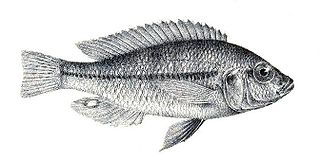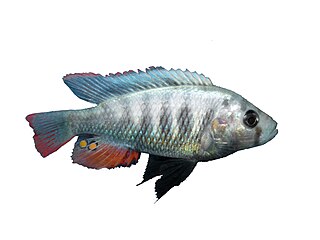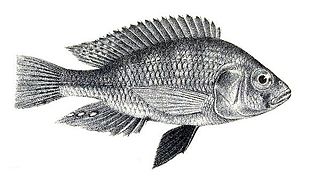 W
WHaplochromis argens is a species of haplochromine cichlid endemic to Lake Victoria where it is only known from the Tanzanian portion. This species reaches a length of 7.6 centimetres (3.0 in) SL. It feeds on zooplankton.
 W
WHaplochromis goldschmidti is a species of cichlid endemic to Lake Victoria, where it is only known to occur with certainty in the southern part of the Emin Pasha Gulf. It feeds mainly on zooplankton and some insects. This species can reach a length of 6.9 centimetres (2.7 in) SL. The specific name honours the Dutch evolutionary biologist Paul-Tijs (Tijs) Goldschmidt who he studied cichlids in Lake Victoria as a researcher from Leiden University.
 W
WHaplochromis granti is a species of cichlid endemic to Lake Victoria, though it may now be extinct. This species can reach a length of 12.2 centimetres (4.8 in) SL. The specific name honours the Scottish naturalist and explorer James Augustus Grant (1827-1892) who was the co-discoverer of Lake Victoria's role as a major source of the Nile, alongside John Henning Speke.
 W
WHaplochromis guiarti is a species of cichlid endemic to Lake Victoria though it may now be extinct. This species can reach a length of 17.7 centimetres (7.0 in) SL. The specific name honours the French parasitologist Jules Guiart (1870-1965), who was a friend of Jacques Pellegrin's.
 W
WHaplochromis mento is a species of cichlid endemic to Lake Victoria. This species can reach a length of 17.8 centimetres (7.0 in) SL.
 W
WHaplochromis microdon is a species of cichlid endemic to Lake Victoria though it may now be extinct. This species can reach a length of 14.8 centimetres (5.8 in) SL.
 W
WHaplochromis nuchisquamulatus is a species of cichlid found in Lake Victoria and the adjacent reaches of the Nile. This species can reach a length of 11.3 centimetres (4.4 in) SL.
 W
WHaplochromis nyererei is a species of cichlid endemic to Lake Victoria in Africa. This species can reach a length of 7.7 centimetres (3.0 in) SL. The specific name honours Julius Nyerere (1922-1999) who was President of Tanzania from 1961–1985.
 W
WHaplochromis prognathus is a species of cichlid endemic to Lake Victoria. This species can reach a length of 14.1 centimetres (5.6 in) SL.
 W
WHaplochromis pundamilia is a species of cichlid endemic to the Tanzanian portions of Lake Victoria. This species can reach a length of 12.4 centimetres (4.9 in) SL.
 W
WHaplochromis sauvagei is a species of cichlid endemic to Lake Victoria. This species reaches a length of 10.5 centimetres (4.1 in) SL. Its specific name honours the French paleontologist and ichthyologist Henri Émile Sauvage (1842-1917).
 W
WHaplochromis serranus is a species of cichlid endemic to Lake Victoria. This species reaches a length of 20.5 centimetres (8.1 in) SL.
 W
WHaplochromis victorianus is a species of cichlid endemic to Lake Victoria though it may now be extinct. This species reaches a length of 16.6 centimetres (6.5 in) SL.
 W
WHaplochromis vonlinnei is a species of cichlid endemic to Lake Victoria. It is greyish in color with a distinct mid-lateral band, and a rather slender shape. It feeds mainly on smaller fish. This species can reach a length of 15.9 centimetres (6.3 in) SL. The population of the species has declined due to the introduction of the Nile perch in the 1950s. It has not been recorded since 1980 and the IUCN lists it as "Critically Endangered" and considers it may already be extinct. This fish is named in honour of the Swedish naturalist, Carl Linnaeus.
 W
WThe Lake Victoria squeaker is a species of upside-down catfish that is native to Kenya, Burundi, Tanzania and Uganda where it is found in Lakes Kioga and Victoria and the Victorian Nile the lower Kagera River and the Malagarasi River drainage. It was first described by British-Belgian zoologist George Albert Boulenger in 1906, from specimens collected in the Lake Victoria at Buganga, Uganda and Entebbe, Uganda by Mr. E. Degen. The species name victoriae is derived from the location where the species was originally discovered, Lake Victoria.
 W
WThe Ripon barbel is an East African ray-finned fish species in the family Cyprinidae. A huge barb, its maximum recorded total length is 90 cm (35 in).